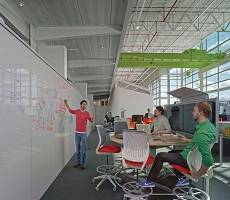July 23, 2014
Three major UK office developments get green light following months of talk

Plans for the new Astra Zeneca facility in Cambridge by Herzog & de Meuron
Three of the most talked about UK office developments have been given the go ahead within the space of a few days. The Government has finally announced that the new construction headquarters for HS2 will be in Birmingham, rather than London. Meanwhile, following all of the wrangling about its proposed takeover by Pfizer, Astra Zeneca has announced that the controversial move of its research facility from Cheshire to a new base in Cambridge will involve the creation of a new £330 million complex designed by Swiss architects Herzog & de Meuron. Finally, planning consent has been granted for the 4.9 million sq ft Wood Wharf development in docklands including nearly 2 million sq ft of office space which the developer claims will be aimed at the thriving London technology, media and telecommunications (TMT) sector.






 The UK’s snail-paced broadband infrastructure isn’t up to the demands placed on it by 21st century businesses and there is not enough ambition to bring it up to speed with that of other nations, according to a new report from the Federation of Small Businesses. The report found that while nearly all small business owners (94 percent) consider a reliable internet connection essential, just 15 percent are happy with their provision and a staggering 45,000 small businesses are still dependant on a dial-up connection and many more are struggling by with slow broadband speeds under 2 Megabits per second (Mbps). The FSB also claims that current Government targets of 24Mbps for 95 per cent of the population and 2Mbps for the remaining five per cent will not meet future demands and that it should commit to delivering a minimum of 10Mbps (megabits per second) for all homes and businesses by 2017 rising to 1Gbps (gigabit per second) by 2030.
The UK’s snail-paced broadband infrastructure isn’t up to the demands placed on it by 21st century businesses and there is not enough ambition to bring it up to speed with that of other nations, according to a new report from the Federation of Small Businesses. The report found that while nearly all small business owners (94 percent) consider a reliable internet connection essential, just 15 percent are happy with their provision and a staggering 45,000 small businesses are still dependant on a dial-up connection and many more are struggling by with slow broadband speeds under 2 Megabits per second (Mbps). The FSB also claims that current Government targets of 24Mbps for 95 per cent of the population and 2Mbps for the remaining five per cent will not meet future demands and that it should commit to delivering a minimum of 10Mbps (megabits per second) for all homes and businesses by 2017 rising to 1Gbps (gigabit per second) by 2030.















July 24, 2014
The collaboration between BIFM and CIPD unites the workplace tribes
by James Sutton • Comment, Facilities management, Workplace
(more…)